Confidentiality Agreement Letter
Dear [Recipient],
I am writing to you regarding the confidential information that we have discussed during our recent meeting. As we both know, this information is highly sensitive and must be kept strictly confidential to protect the interests of our respective organizations.
To ensure that our discussions and any information shared remain confidential, I would like to propose that we enter into a confidentiality agreement. This agreement will help us both to ensure that the confidential information shared during our discussions is not disclosed or used in any way that could harm our organizations.
I have attached a draft of the confidentiality agreement for your review. Please take the time to read through it carefully and let me know if you have any questions or concerns. Once we have both agreed on the terms of the agreement, we can sign it and move forward with our discussions.
I believe that entering into a confidentiality agreement is essential to protecting the information that we have discussed, and I hope that you agree. If you have any further questions or concerns, please do not hesitate to contact me.
Thank you for your attention to this matter.
Sincerely,
[Your Name]
MUTUAL NON-DISCLOSURE AGREEMENT
This Mutual Nondisclosure Agreement ("Agreement") is made between the entities listed below, which may sometimes hereinafter be referred to as "the parties":
Party 1: ……………………………………………
Party 2: ……………………………………………
It is understood and agreed to that the parties would like to exchange certain information that may be considered confidential. To ensure the protection of such information and in consideration of the agreement to exchange said information, the parties agree as follows:
1. The confidential information to be disclosed under this Agreement ("Confidential Information") can be described as and includes:
Technical and business information relating to proprietary ideas patentable ideas and/or trade secrets, existing and/or contemplated products and services, research and development. production, costs, profit and margin information, finances and financial projections, customers, clients, marketing, and current or future business plans and models, regardless of whether such information is designated as "Confidential Information" at the time of its disclosure.
In addition to the above, Confidential information shall also include, and the parties shall have a duty to protect, other confidential and/or sensitive information which is (a) disclosed as such in writing and marked as confidential (or with other similar designation) at the time of disclosure; and/or (b) disclosed by in any other manner and identified as confidential at the time of disclosure and is also summarized and designated as confidential in a written memorandum delivered within thirty (30) days of the disclosure.
2. The parties shall use the Confidential Information only for the purpose of evaluating potential business, employrnent and/or investment relationships.
3. The parties shall limit disclosure of Confidential Information within its own organization to its directors, officers, and partners. Members and/or employees having a need to know and shall not disclose Confidential Information to any third party (whether an individual, corporation, or other entity) without prior written consent. The parties shall satisfy its obligations under this paragraph if it takes affirmative measures to ensure compliance with these confidentiality obligations by its employees, agents, consultants and others who are permitted access to or use of the Confidential Information.
4, This Agreement imposes no obligation upon the parties with respect to any Confidential Information that was possessed before receipt; (b) is or becomes a matter of public knowledge through no fault of receiving party; (c) is rightfully received from a third party not owing a duty of confidentiality; (d) is disclosed without a duty of confidentiality to a third party by, or with the authorization of the disclosing party; or (e) is independently developed
5. The parties warrant that they have the right to make the disclosures under this Agreement.
6. This Agreement shall not be construed as creating, conveying, transferring, granting or conferring upon either party any rights, License or authority in or to the information exchanged, except the limited right to use Confidential Information specified in paragraph 2. Furthermore and specifically, no license or conveyance of any intellectual property rights is granted or implied by this Agreement,
7. Neither party has an obligation under this Agreement to purchase any service, goods, or intangibles from the other party. Furthermore, both parties acknowledge and agree that the exchange of information under this Agreement shall not commit or bind either party to any present or future contractual relationship (except as specifically stated herein), nor shall the exchange of information be construed as an inducement to act or not to act in any given manner.
8. Neither party shall be liable to the other in any manner whatsoever for any decisions. Obligations, costs or expenses incurred. Changes in business practices, plans, organization, products, services, or otherwise, based on either party's decision to use or rely on any information exchanged under this Agreement.
9. If there is a breach or threatened breach of any provision of this Agreement, it is agreed and understood that the non-breaching party shall have no adequate remedy in money or other damages and accordingly shall be entitled to injunctive relief; provided however, no specification in this Agreement of any particular remedy shall be construed as a waiver or prohibition of any other remedies in the event of a breach or threatened breach of this Agreement.
10. This Agreement states the entire agreement between the parties concerning the disclosure of confidential information and supersedes any prior agreements, understandings, or representations with respect thereto. Any addition or modification to this Agreement must be made in writing and signed by authorized representatives of both parties. This Agreement is made under and shall be construed according to the laws of …………... In the event that this agreement, is breached, any and all disputes must be settled in a court of competent jurisdiction in the ………………..
11. If any of the provisions of this Agreement are found to be unenforceable, the remainder shall be enforced as fully as possible and the unenforceable provisions) shall be deemed modified to the limited extent required to permit enforcement of the Agreement as a whole.
WHEREFORE, the parties acknowledge that they have read and understand this Agreement and voluntarily accept the duties and obligations set forth herein.
On behalf of …………………………………..
Name: ………………………………
Signature: …………………………..
Signature: …………………………………..
On behalf of …………………………………..
Name: ………………………………
Signature: …………………………..
Signature: …………………………………..
Standard Employee Confidentiality Agreement Letter
Subject: Confidentiality Agreement for Employment
Dear [Employee Name],
This letter outlines the confidentiality agreement between [Company Name] and you as part of your employment terms. The purpose of this agreement is to protect all proprietary and sensitive information you may access during your employment.
You agree to keep all company data, trade secrets, client information, project details, and any internal documentation strictly confidential. Disclosure of such information to unauthorized individuals, either during or after your employment, is strictly prohibited.
This confidentiality obligation remains in effect indefinitely, even after your employment with [Company Name] ends. Please review the attached agreement carefully and sign below to confirm your understanding and acceptance of the terms.
Sincerely,
[Your Name]
[Your Position]
[Company Name]
Confidentiality Agreement Letter for Contractors
Subject: Contractor Confidentiality Agreement
Dear [Contractor Name],
As part of our professional engagement with [Company Name], this confidentiality agreement establishes the terms under which you will handle proprietary and confidential information shared during the course of our project.
You agree not to disclose, reproduce, or use any confidential data—including project plans, client lists, financial data, or intellectual property—without prior written consent from [Company Name]. This obligation applies both during and after the project’s completion.
Please sign and return a copy of this letter as acknowledgment of your acceptance of these confidentiality obligations. We appreciate your cooperation and professionalism.
Sincerely,
[Your Name]
[Title]
[Company Name]
Mutual Confidentiality Agreement Letter
Subject: Mutual Confidentiality Agreement
Dear [Recipient Name],
This letter serves as a mutual confidentiality agreement (“Agreement”) between [Party A] and [Party B]. Both parties agree to exchange certain proprietary or confidential information for the purpose of [Purpose/Project Name].
Each party agrees to maintain the confidentiality of all disclosed information and to use it solely for the intended purpose stated above. Confidential materials must not be shared with third parties without written consent from the originating party.
This agreement shall remain in effect for [Duration] from the date of signing and continues to apply to all information disclosed prior to termination.
Kind regards,
[Your Name]
[Title]
[Organization Name]
Client Confidentiality Agreement Letter
Subject: Client Confidentiality Commitment
Dear [Client Name],
We, at [Company Name], understand the importance of maintaining your privacy and protecting your sensitive information. This letter serves as our commitment to confidentiality regarding all data, materials, and communications exchanged during our business relationship.
Our team agrees not to disclose or use your information for any purpose other than the services outlined in our agreement. All employees and partners involved are bound by internal confidentiality policies to ensure data protection.
We appreciate your trust in us and assure you of our full compliance with confidentiality standards.
Sincerely,
[Your Name]
[Your Position]
[Company Name]
Non-Disclosure Agreement Letter for Business Partners
Subject: Non-Disclosure Agreement (NDA) Confirmation
Dear [Partner Name],
This letter confirms our mutual understanding that all shared information between [Your Company Name] and [Partner Company Name] will remain confidential. Both parties agree not to disclose or misuse proprietary information for purposes beyond our partnership discussions.
The agreement applies to business strategies, client details, pricing models, and any sensitive documents shared in meetings or correspondence. Breach of this agreement may result in legal action and termination of collaboration.
Please review, sign, and return this letter to indicate your acceptance.
Sincerely,
[Your Name]
[Your Title]
[Company Name]
Confidentiality Agreement Letter for Interns
Subject: Confidentiality Agreement for Internship
Dear [Intern Name],
As part of your internship at [Company Name], you may have access to confidential company data, client information, or internal systems. This letter outlines the confidentiality obligations you must adhere to throughout your internship and beyond.
You agree not to share, duplicate, or discuss any confidential information with individuals outside the organization. Any breach of this agreement may result in disciplinary action or termination of your internship.
Please sign and return this letter to confirm your understanding and acceptance of these terms.
Best regards,
[Your Name]
[Position]
[Company Name]
Vendor Confidentiality Agreement Letter
Subject: Vendor Confidentiality Commitment
Dear [Vendor Name],
To ensure the protection of sensitive information exchanged between [Company Name] and your organization, this letter confirms our mutual confidentiality agreement. You are required to maintain strict confidentiality concerning all documents, pricing details, client data, and communications received from us.
Information shared is to be used only for the intended business purposes and may not be disclosed to unauthorized parties. Any breach of confidentiality will be considered a violation of this agreement and may lead to contract termination.
Thank you for your cooperation and professionalism.
Sincerely,
[Your Name]
[Your Position]
[Company Name]
Confidentiality Agreement Email for Interview Process
Subject: Confidentiality Agreement for Interview Discussion
Dear [Candidate Name],
Before proceeding with the next stage of our interview process, we kindly request your acknowledgment of confidentiality. During interviews, you may receive insights about our internal systems, strategies, and projects that must remain private.
By responding to this email with your confirmation, you agree not to disclose or share any information discussed during the interview with third parties.
We appreciate your understanding and cooperation.
Sincerely,
[Your Name]
[HR Department]
[Company Name]
Research Collaboration Confidentiality Agreement Letter
Subject: Confidentiality Agreement for Research Collaboration
Dear [Research Partner Name],
This letter outlines the confidentiality terms for our collaborative research project titled “[Project Name].” Both parties agree to protect all data, results, and intellectual property exchanged during the collaboration.
Information shared will be used solely for research purposes and will not be published or distributed without mutual consent. Any breach of confidentiality could result in immediate termination of the agreement and potential legal action.
Please sign below to acknowledge acceptance of these terms.
Sincerely,
[Your Name]
[Title]
[Institution Name]
Temporary Employee Confidentiality Agreement Letter
Subject: Confidentiality Agreement for Temporary Employment
Dear [Temporary Employee Name],
As part of your short-term engagement with [Company Name], this letter serves to confirm your obligation to maintain confidentiality regarding all company information, client details, and business activities you may encounter during your assignment.
You are prohibited from disclosing any confidential material to outside parties or competitors, both during and after your employment term. Any violation of these terms may lead to immediate termination and legal consequences.
Please review, sign, and return this document before your start date.
Sincerely,
[Your Name]
[Position]
[Company Name]
What is a Confidentiality Agreement Letter and Why is it Important
A confidentiality agreement letter is a written document that binds one or more parties to keep shared information private. It protects sensitive data, trade secrets, or intellectual property from being leaked or misused.
This type of letter is essential in professional, academic, and legal contexts where trust and data protection are critical. It also provides legal recourse in case of a breach of confidentiality.
Who Should Issue a Confidentiality Agreement Letter
A confidentiality agreement letter can be issued by:
- Employers hiring new employees, contractors, or interns.
- Businesses engaging with vendors or partners.
- Research institutions collaborating on sensitive studies.
- Companies before mergers, acquisitions, or negotiations.
- Individuals protecting personal or business data.
It should always come from the party seeking to protect proprietary or confidential information.
Whom Should the Letter Be Addressed To
The letter should be directed to anyone who will have access to private or proprietary data, including:
- Employees and interns
- Business partners and vendors
- Contractors or consultants
- Research collaborators
- Job applicants or interviewees
Essentially, it is addressed to any individual or organization that will handle confidential material.
When Do You Need to Send a Confidentiality Agreement Letter
You should send a confidentiality agreement letter before any confidential information is shared. Common occasions include:
- Before employment or onboarding.
- Prior to project discussions with vendors or clients.
- Before starting research collaborations.
- During mergers, acquisitions, or negotiations.
- Prior to interviews or consulting sessions where sensitive details may be discussed.
The timing ensures legal protection before exposure of information.
How to Write a Confidentiality Agreement Letter
To write an effective confidentiality agreement letter:
- Start with a clear subject and introduction explaining its purpose.
- Define what information is considered confidential.
- Specify restrictions on disclosure and use.
- Include the duration of the agreement.
- Mention penalties or consequences for breaches.
- Request a signature or written acknowledgment.
Clarity and precision are key to ensuring legal validity and mutual understanding.
Formatting and Tone of a Confidentiality Agreement Letter
- Length: Usually one to two pages.
- Tone: Formal, professional, and legally precise.
- Structure: Introduction → Obligations → Duration → Consequences → Signature.
- Medium: Printed letter or digitally signed PDF.
- Language: Avoid emotional tone; use clear, neutral legal terms.
Maintaining professionalism reinforces the seriousness of the agreement.
Requirements and Prerequisites Before Writing the Letter
Before writing, ensure that you have:
- Identified what information qualifies as confidential.
- Consulted legal counsel to verify compliance.
- Listed all parties who will access confidential data.
- Determined the agreement’s validity period.
- Created a system for storing signed copies securely.
Preparation ensures the document’s legal strength and clarity.
Mistakes to Avoid in a Confidentiality Agreement Letter
- Leaving the term “confidential information” undefined.
- Using vague or overly broad clauses.
- Forgetting to include duration or termination conditions.
- Not obtaining signed acknowledgment.
- Sharing information before the agreement is signed.
Avoiding these mistakes prevents disputes and strengthens legal enforceability.
After Sending: What to Do Next
Once the letter is signed:
- Keep a digital and physical copy for records.
- Share the signed version with all involved parties.
- Monitor compliance with the agreement terms.
- Remind employees or partners about confidentiality expectations.
Regular reinforcement maintains trust and compliance throughout the relationship.
Pros and Cons of a Confidentiality Agreement Letter
Pros:
- Protects sensitive and proprietary information.
- Legally enforces privacy obligations.
- Builds trust between business partners.
- Helps prevent intellectual property theft.
Cons:
- May slow down discussions if parties require legal review.
- Can seem overly strict in informal collaborations.
- May require legal support to enforce in disputes.
Elements and Structure of a Confidentiality Agreement Letter
Essential elements include:
- Title and purpose of the agreement.
- Identification of parties.
- Definition of confidential information.
- Terms of disclosure and duration.
- Legal consequences for breaches.
- Signature lines for both parties.
These elements ensure the agreement is binding and comprehensive.
Compare and Contrast: Confidentiality Letters vs Non-Disclosure Agreements (NDAs)
While both documents protect information, there are key differences:
- A confidentiality agreement letter is simpler and more flexible, often used for general situations.
- A Non-Disclosure Agreement (NDA) is a formal legal document with detailed clauses and enforceable terms.
- Letters are suitable for routine use; NDAs are for complex or high-risk situations.
Both serve the same goal—protecting confidential information.
Tips and Best Practices for Writing a Strong Confidentiality Agreement Letter
- Be specific about what is considered confidential.
- Clearly define how long the confidentiality obligation lasts.
- Ensure both parties sign before sharing any information.
- Use plain language to avoid misinterpretation.
- Review the letter periodically for relevance and updates.
Strong documentation fosters trust and legal protection.
Does a Confidentiality Agreement Require Attestation or Authorization
In most cases, a confidentiality agreement does not require notarization or attestation. However:
- High-value contracts or international partnerships may require witness signatures.
- Legal counsel review is recommended for business-critical agreements.
- For government or research projects, notarization might be required for compliance.
Always verify the requirements based on local laws and industry standards.
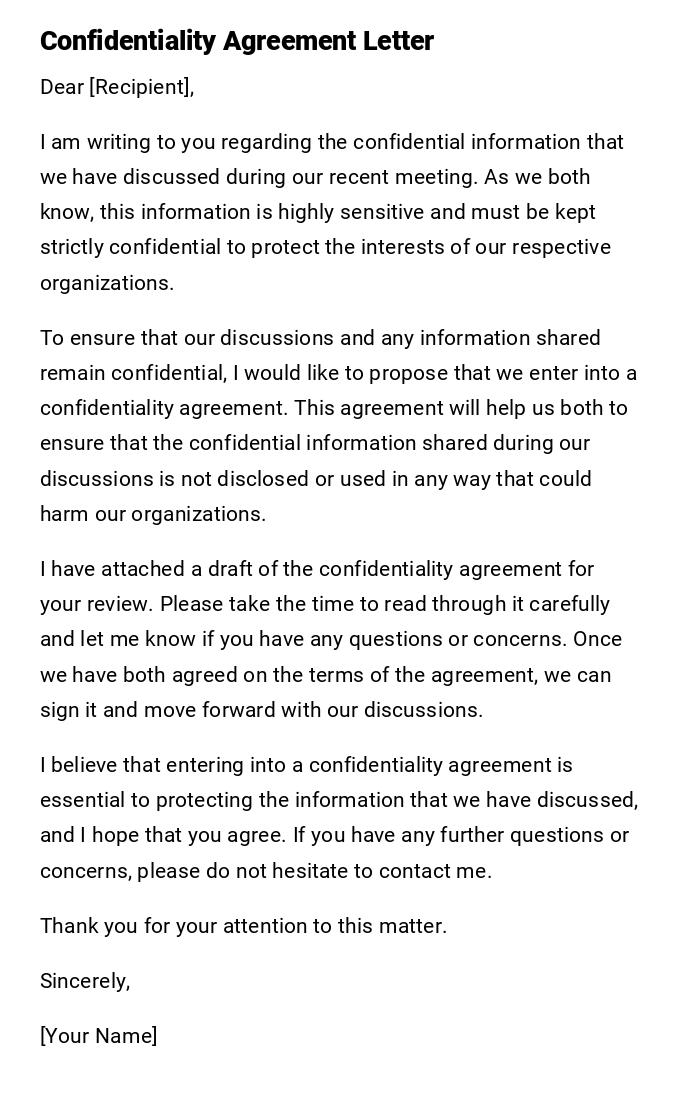
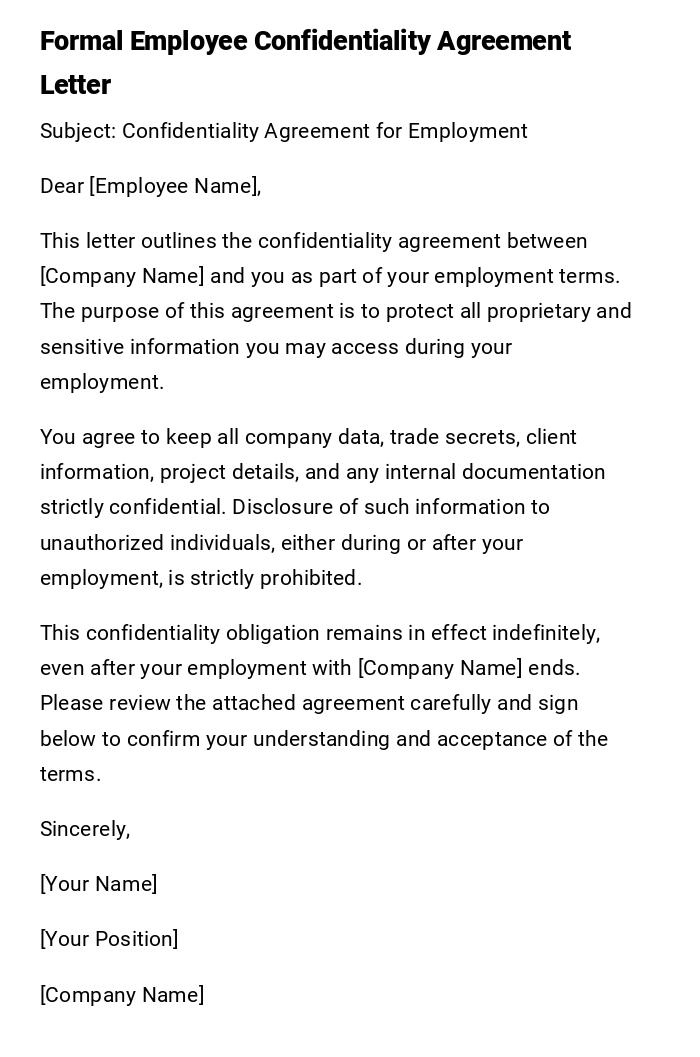
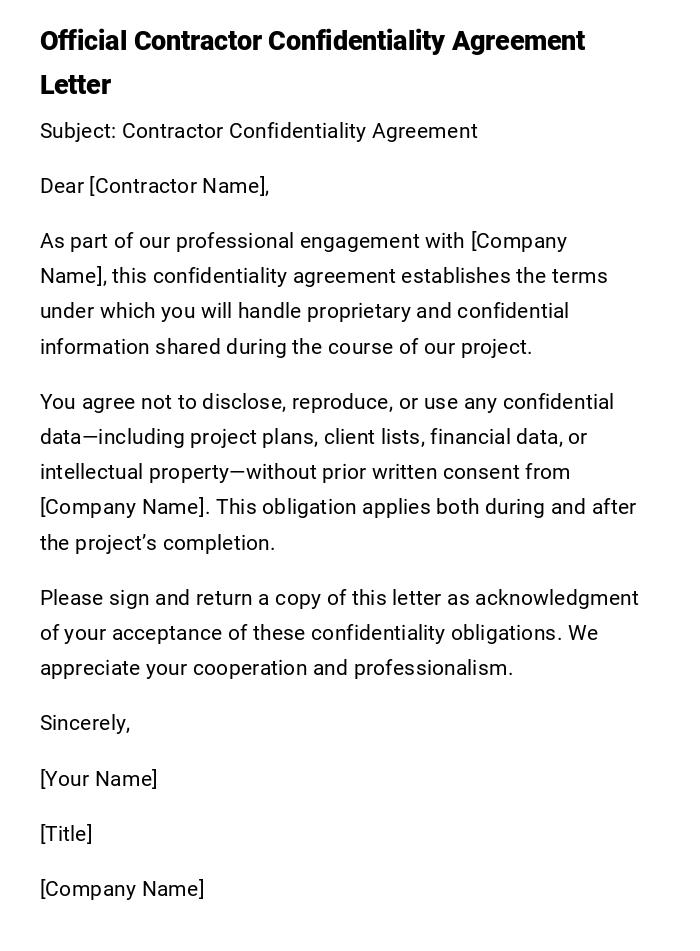
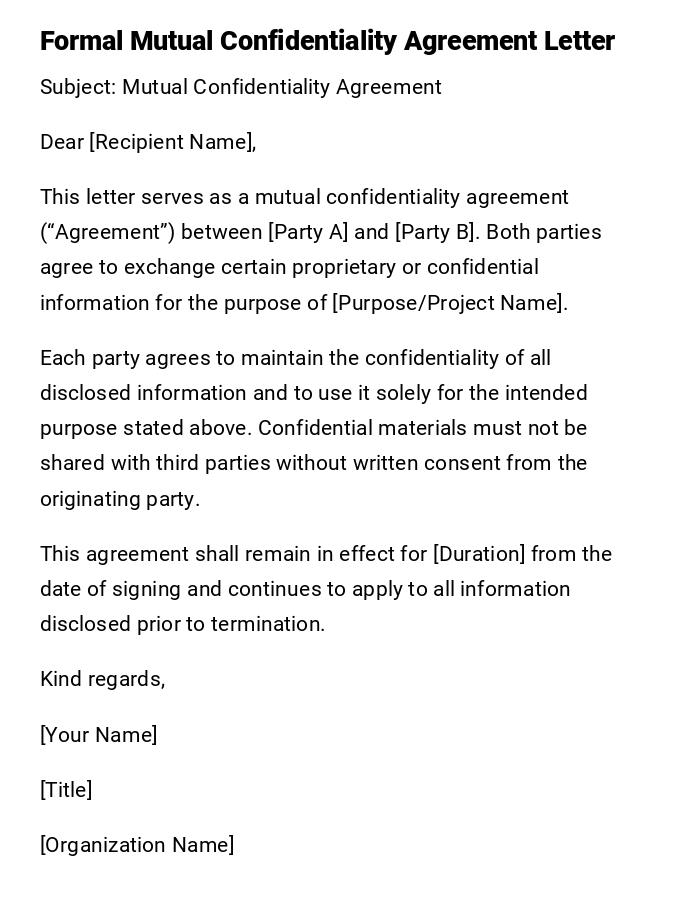
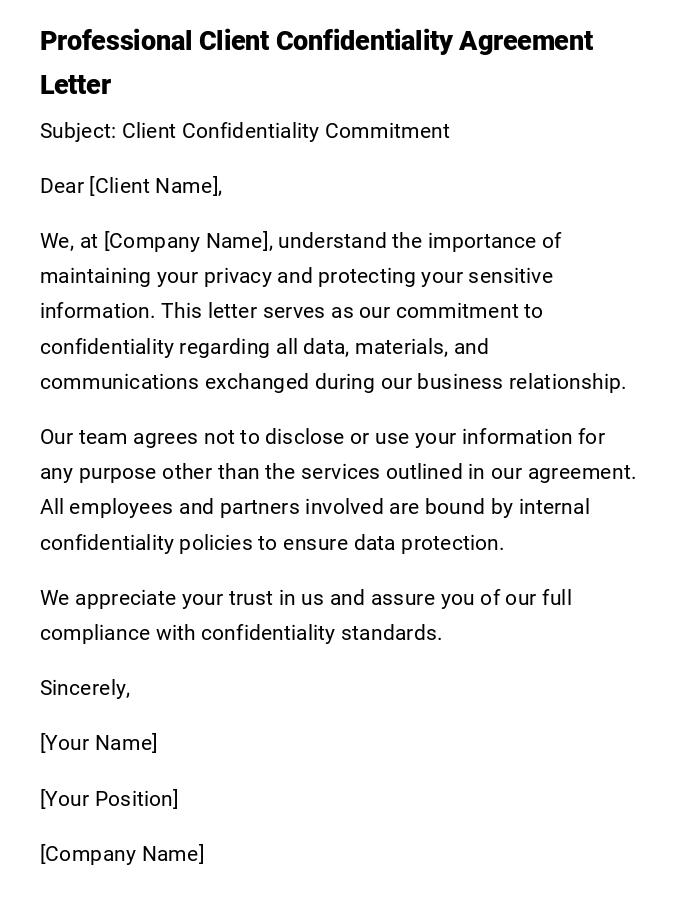
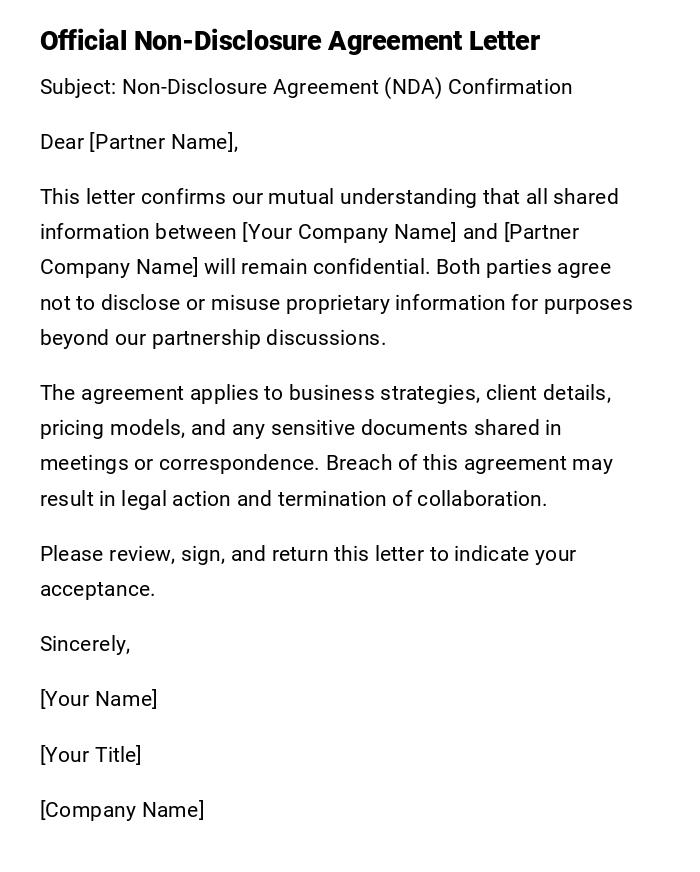
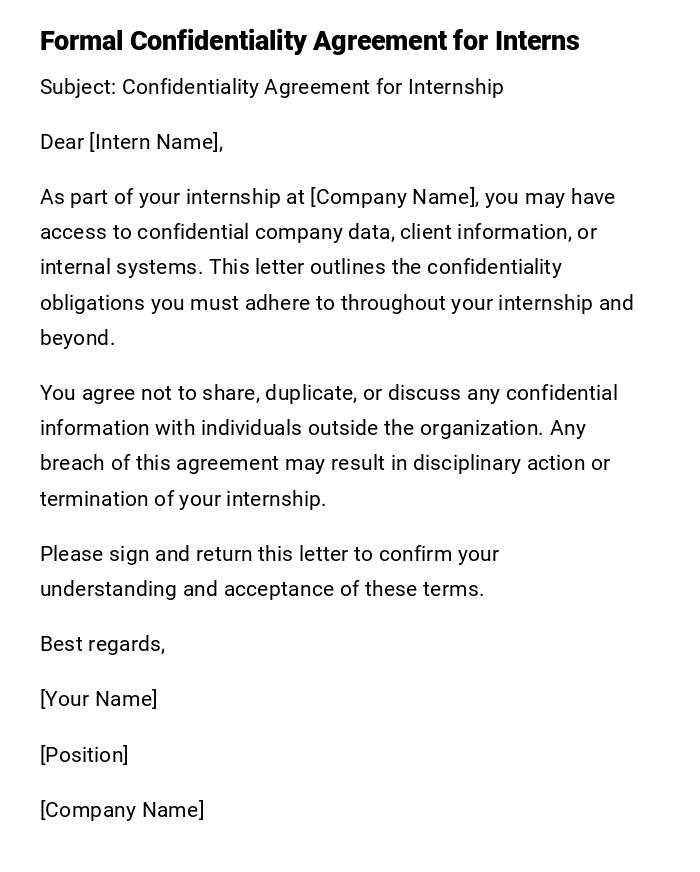
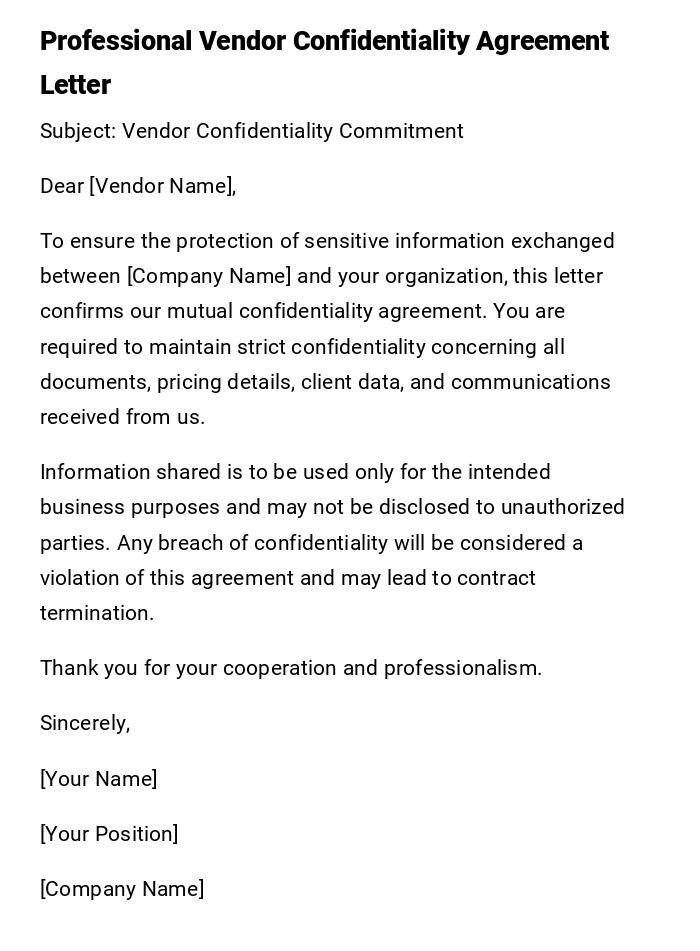
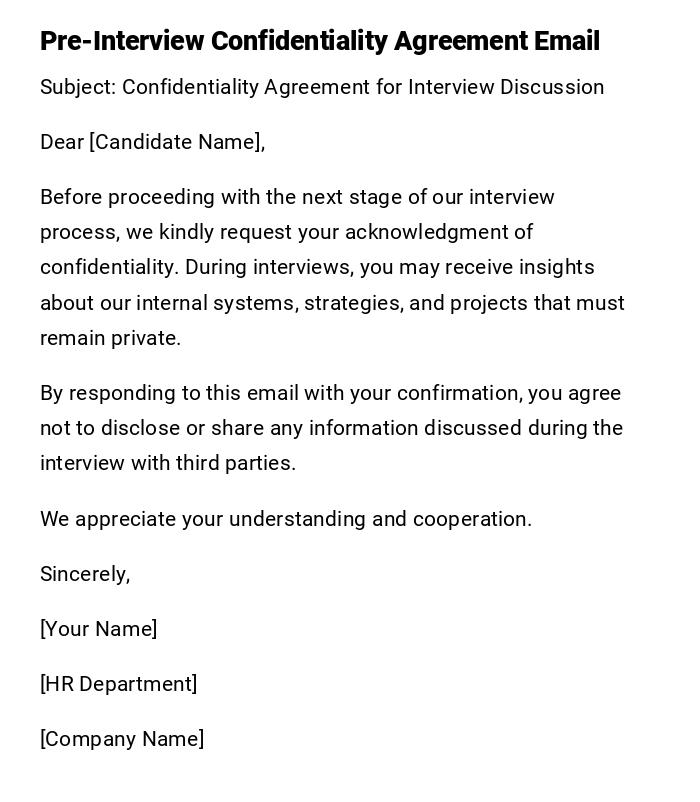
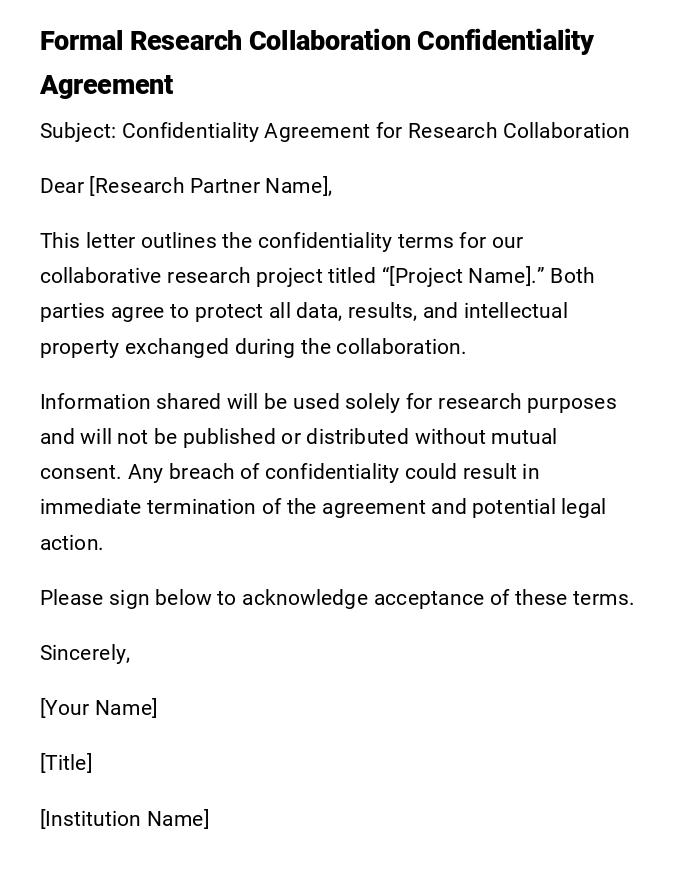
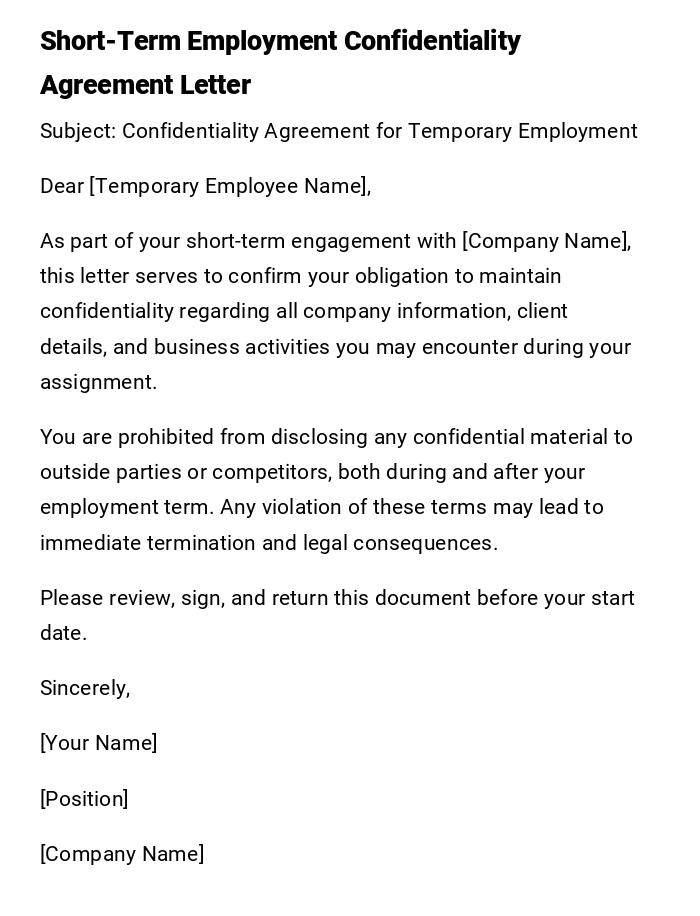

 Download Word Doc
Download Word Doc
 Download PDF
Download PDF